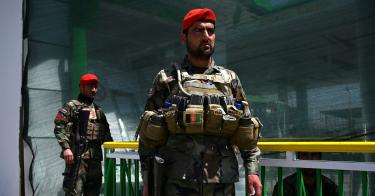On December 18, 2011, the last U.S. military convoy from Iraq entered Kuwait. I stood near Gen. Lloyd Austin as we watched the gate slowly close behind them at the Khabari Crossing, symbolically ending the war.
It wasn’t Austin’s choice. He had recommended that the U.S. leave a residual military force in Iraq to maintain influence, counter malign influence and continue training the Iraqi Security Forces. But the Obama administration had other ideas and ordered a complete withdrawal.
A decade later, it appears that Austin, now the secretary of defense, will preside over another complete withdrawal—this one from Afghanistan—that runs counter to the advice of senior military leaders.
The U.S will likely come to regret President Biden’s April 14 decision to withdraw. Without the current small but meaningful U.S. military presence, Afghanistan (at least outside Kabul) will likely fall to the Taliban. The country will once more become a spawning ground for terror, and hard-won improvements in freedom and human rights will quickly evaporate under harsh Sharia law.
>>> Now Is Not the Time to Repeat Obama’s Iraq Mistake in Afghanistan
While the decision to withdraw is regrettable, it became all but inevitable once both 2020 presidential candidates started referring to U.S. operations in Afghanistan as a “forever war.” In declaring it was “past time to end the forever wars, which have cost the United States untold blood and treasure,” Candidate Joe Biden echoed President Trump’s earlier pledge to “end America’s endless wars and bring U.S. soldiers home.”
In pursuit of that goal, the Trump administration in 2020 struck a misguided deal with the Taliban. In essence, it gave them a free pass to attack our partners, the Afghan army, in return for not attacking U.S. forces.
Neither candidate found it advantageous to explain to the American people that, since 2014, the U.S. mission in Afghanistan has been limited to training and assisting the Afghans --- not fighting. But that limited mission was hugely important. Like seasoning in a stew, just a few well-placed advisors and enablers can make a big difference.
Unlike the surrenders in Tokyo Bay or at Appomattox Courthouse, modern conflict—especially insurgencies—won’t end with loose ends neatly wrapped up, combatants reintegrated, and societies rebuilt. Today’s civil wars “end” with times of peace interrupted by intermittent violence. Success means ensuring longer periods of relative peace. That is what success looks like in Korea and that’s what it would look like in Afghanistan.
The Korean conflict ended with a cessation of hostilities, not a formal peace. More than 25,000 U.S. troops are stationed there today to help our South Korean ally preserve peace. Yet, no one calls for the end of the “forever war” in Korea.
In the case of the war with Iraq, once the fighting died down, the American presence was greatly reduced. Yet even with just a small presence, U.S. military advisors in key Iraqi ministries were able to exert a helpful influence on those leaders. Austin himself had access to Prime Minister Nouri al-Maliki.
But after the 2011 withdrawal, U.S. influence evaporated. Maliki set about replacing competent military leaders with those closely allied to him personally. The results were as disastrous as they were predictable.
>>>Repealing Both Iraq War Authorizations Is Needed to Rein In Presidents
In just two-and-a-half years, ISIS had captured a huge swathe of Iraq and its second largest city. The U.S. had to send troops back in. By April 2016, about 5,000 American service members in Iraq and Austin’s 2011 recommendation to keep a small U.S. presence seemed prescient.
Afghanistan is not Iraq, but 10 years later, Austin now finds himself in a similar situation, caught between a White House determined to completely pull out of a nascent nation and military commanders—reportedly including Joint Chiefs Chairman Gen. Mark Milley, and the 4-star commanders of Central Command and Afghanistan—who believe it would be a mistake.
Speaking of those senior military leaders, Austin said, “Their voices were heard and their concerns taken into consideration as the president made his decision. But now the decision has been made, I call upon them to lead their forces ... through this transition.”
President Biden’s Interim National Security Guidance places a high premium on promoting democracy and for “standing behind our allies.” It’s difficult to see that guidance reflected in the decision to depart Afghanistan. And for Lloyd Austin, it must feel like déjà vu all over again.
This piece originally appeared in RealClear Defense



